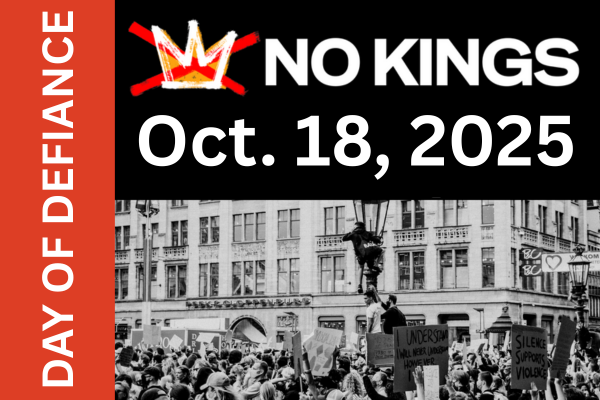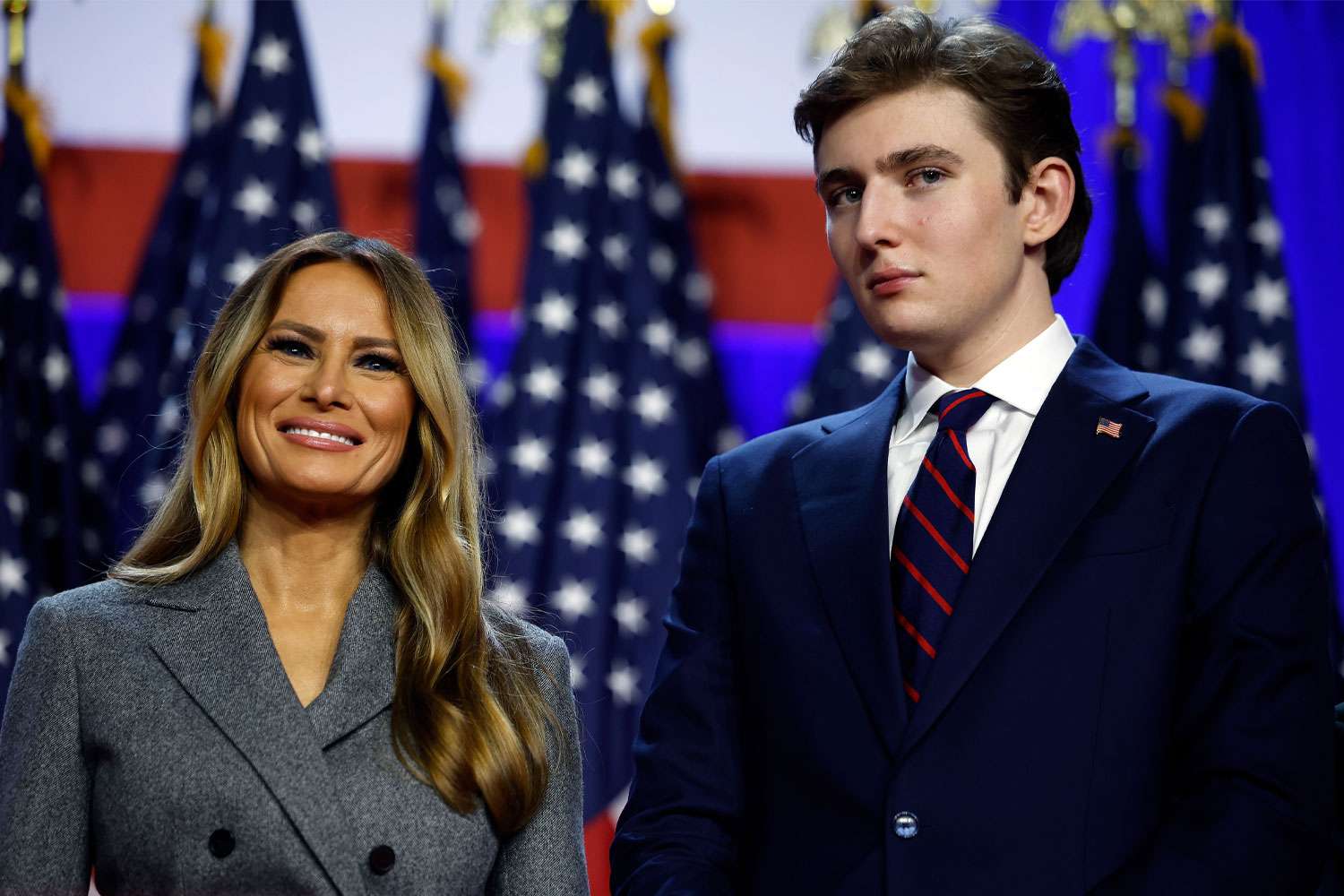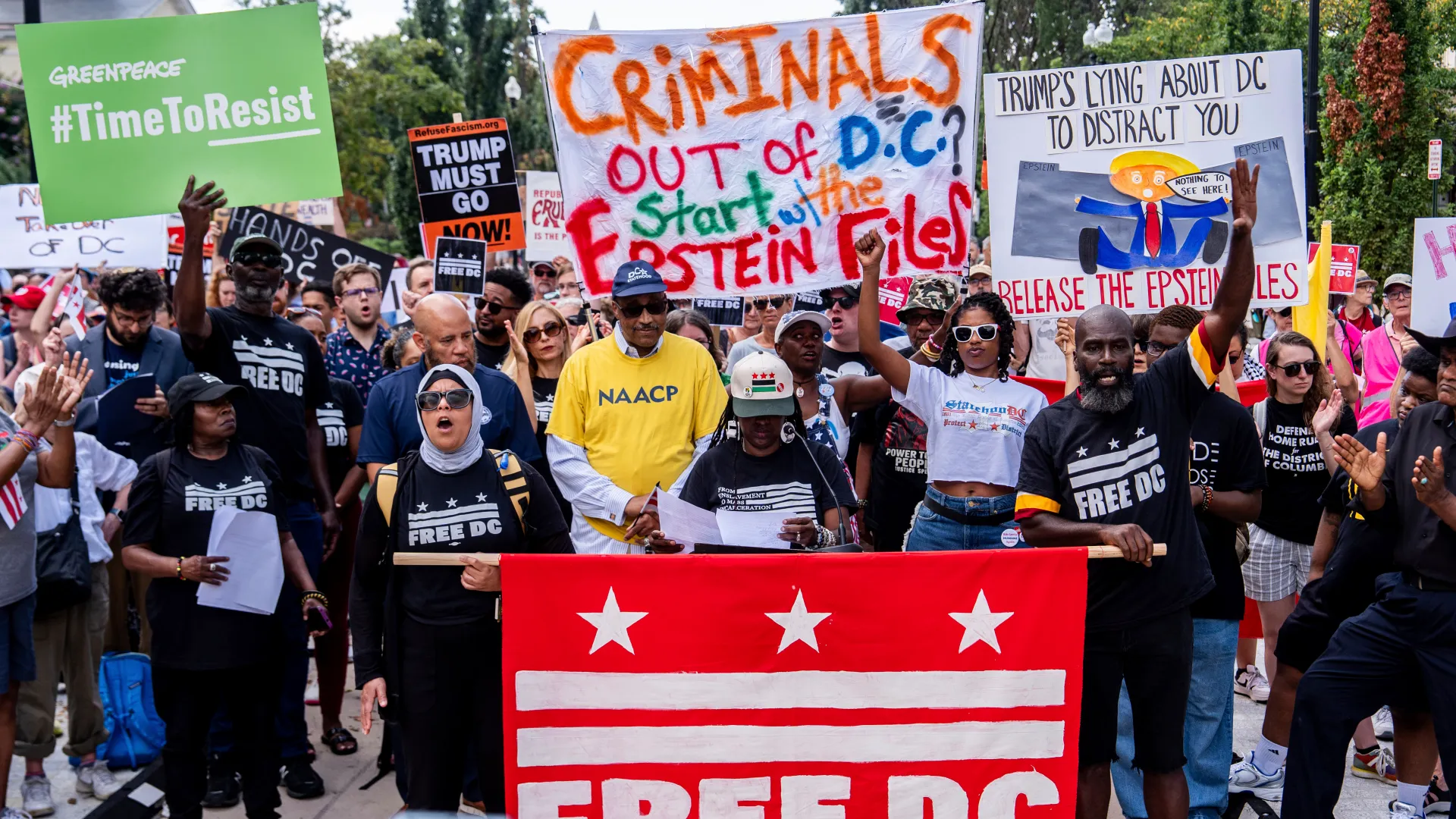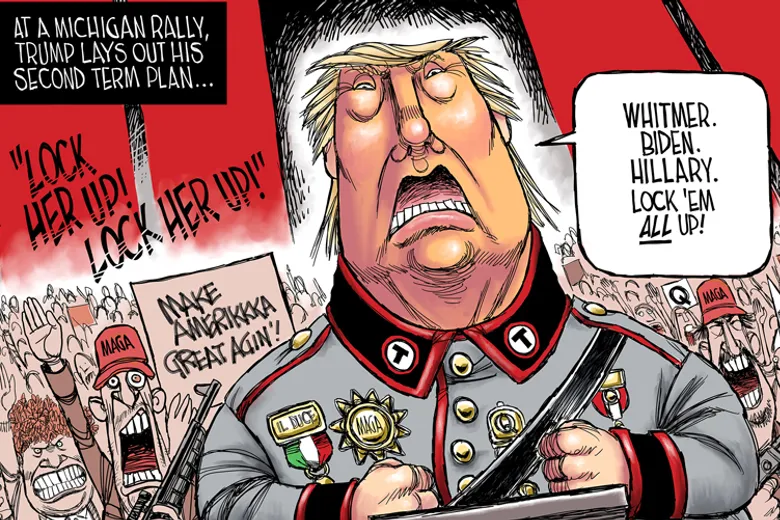
No Dictators. No Kings. No Fascist Regimes.
The "No Kings 2.0" nationwide protests on October 18, 2025, are being planned by the "50501 Movement" and a coalition of organizers are preparing for millions of people to take part in events across all 50 states.
Go to MobilizePetition to Deport Melania Trump: Hypocrisy and the Immigration Debate.
October 9, 2025
A controversial online petition demanding the deportation of former First Lady Melania Trump, her parents, and in some versions, her son Barron Trump.
Petition to Deport Melania Trump: Hypocrisy and the Immigration Debate.

A controversial online petition demanding the deportation of former First Lady Melania Trump, her parents, and in some versions, her son Barron Trump, has gone viral, igniting a fierce debate about immigration standards, political hypocrisy, and the limits of naturalized citizenship.
The petition, circulating on platforms like MoveOn, emerged amid President Donald Trump's reported plans for an immigration crackdown that could target naturalized citizens and reinterpret the 14th Amendment's guarantee of birthright citizenship. Supporters of the petition argue that if the proposed stringent policies are to be enforced, the Trump family should not be exempt, making a potent political point about double standards.
The Core of the Controversy
At the heart of the deportation demand are two key points:
- The Charge of Hypocrisy: Critics argue that Donald Trump's tough stance on immigration and call for mass deportations clash sharply with his own family's immigration history. Melania Trump, born in Slovenia (then part of Yugoslavia), became a naturalized U.S. citizen in 2006. She also sponsored her parents, Viktor and Amalija Knavs, for their green cards and later their citizenship, a process commonly known as "chain migration" that Donald Trump has repeatedly vowed to end. The petition's logic is straightforward: If the policies are "good for one, it's good for all," including the former First Lady and her family.
- The "Einstein Visa" Question: Melania Trump's path to permanent residency has been questioned, particularly her use of the EB-1 visa in 2001. This "extraordinary ability" visa, often dubbed the "Einstein visa," is typically reserved for individuals who have demonstrated a sustained national or international acclaim in fields such as science, arts, or business. Her career as a model at the time has led critics to question whether she truly met the stringent, elite criteria for the visa, fueling claims of a privileged fast-track to citizenship.
The petition's rising signature count reflects a broader public frustration over the perceived inconsistencies in the national immigration debate. Proponents see it as a political counter-punch, using Trump's own policies to highlight their far-reaching and potentially disruptive impact.
Political Reactions and the Bigger Picture
The petition has drawn strong reactions across the political spectrum:
- Supporters view it as a legitimate way to hold politicians accountable for their rhetoric and policy proposals. They argue that if the administration is willing to upend decades of immigration law, no one's citizenship should be beyond scrutiny. Democratic figures, such as Representative Maxine Waters, have explicitly called on Trump to investigate his wife's citizenship status as part of his promised crackdowns.
- Critics dismiss the petition as a political stunt, arguing that the former First Lady, a fully naturalized citizen, is being unfairly targeted. They point out that her citizenship was legally obtained and the petition is primarily designed to provoke a reaction and score political points.
While any online petition is symbolic, the viral nature of this one demonstrates how personal and complex the immigration issue remains. It forces a public reckoning with the principle of equal application of the law and asks whether a political agenda can truly be separated from a leader's own family history.
The future of Melania Trump's citizenship is, legally, secure. However, the petition has ensured that the scrutiny of her immigration journey remains a potent symbol in America's ongoing, deeply polarized conversation about who belongs and what the rules should be.
A Showdown in the Rose City: The Controversy Over Federal Troops in Portland.
September 29, 2025
The relationship between the federal government and the city of Portland, Oregon, has once again become a flashpoint, following President Donald Trump’s recent directive to deploy troops to the city.
A Showdown in the Rose City: The Controversy Over Federal Troops in Portland.

The relationship between the federal government and the city of Portland, Oregon, has once again become a flashpoint, following President Donald Trump’s recent directive to deploy troops to the city. Citing a need to protect federal facilities from what he described on social media as "domestic terrorists," the move has ignited a fierce debate about federal overreach, the balance of power, and the reality on the ground in the Pacific Northwest.
This deployment echoes the contentious presence of federal agents in Portland during the summer of 2020, which resulted in clashes, injuries, and a national conversation about law enforcement tactics. Now, years later, the recurring tension highlights a deep divide between local and federal perspectives on public safety and protest.
Local Leaders Push Back
Perhaps the most striking aspect of the situation is the strong, unified opposition from Oregon's state and city leaders. Governor Tina Kotek and Mayor Keith Wilson have been vocal, arguing that the city is not the "war ravaged" area described in the president's statements. They contend that any deployment of federal forces is unnecessary, unrequested, and likely to increase tension, not reduce it.
Mayor Wilson stated clearly: "The number of necessary troops is zero. Our nation has a long memory for acts of oppression, and the president will not find lawlessness or violence here unless he plans to perpetrate it." This sentiment is shared by many local officials who view the deployment as a political provocation rather than a genuine public safety measure.
The Stated Mission vs. The Reality
The administration's justification centers on protecting facilities like the U.S. Immigration and Customs Enforcement (ICE) building, which has been the site of sporadic, smaller-scale protests.
However, local reporters and residents paint a picture vastly different from the one described in federal rhetoric. Residents reported a peaceful city over the weekend, with some visiting the ICE facility only to find a handful of protesters. Critics accuse the administration of relying on misleading or outdated video footage from the intense protests of 2020 to create a false narrative of widespread anarchy, justifying a dramatic display of federal force.
Legal Challenges and Constitutional Questions
The legal ground for the deployment is already being challenged. The state of Oregon has filed a federal lawsuit to block the federalization and deployment of Oregon National Guard members, arguing that the action oversteps presidential authority and potentially violates the Posse Comitatus Act, which generally restricts the use of the military for domestic law enforcement.
This situation forces a spotlight onto fundamental constitutional questions about the limits of federal power in state-level matters. For now, Portland waits—bracing for the arrival of troops while local leaders encourage residents to remain peaceful and "not take the bait" of confrontation. The unfolding events will determine whether the deployment brings calm, or simply ignites another round of conflict.
The balance of power between the federal government and individual states.
August 10, 2025
The balance of power between the federal government and individual states is a cornerstone of the American constitutional system.
The balance of power between the federal government and individual states.

This principle, known as federalism, is a recurring theme throughout the nation's history, from the debates of the Founding Fathers to contemporary political and legal battles. The Constitution delineates specific powers for the federal government while reserving others for the states, with the Tenth Amendment being a key provision that reinforces this division.
In recent years, the concept of federal control over states has re-emerged as a significant point of contention. The Trump administration has taken actions that some view as a challenge to this traditional balance, leading to legal and political pushback from various states. These actions have been centered on several key policy areas, including education, elections, and law enforcement.
For example, the administration has issued directives to states regarding education policy, specifically targeting diversity, equity, and inclusion (DEI) programs. These directives have been met with resistance from many states that argue the federal government is overstepping its authority and interfering with local control over school discipline and curriculum. Some states have filed lawsuits, and a court has issued an injunction to temporarily block the administration from withholding funds from non-compliant schools.
In another instance, the administration has sought to impose new rules on state election systems through an executive order. The order aimed to mandate that voters show proof of citizenship to register using the federal voter registration form. This move has been challenged in court by states and civil rights organizations, who argue that the president lacks the constitutional authority to unilaterally alter election rules, which are traditionally set by states and Congress.
The administration has also used federal funding as a tool to influence state policies. In some cases, federal grants have been withheld or threatened to be withheld from states that do not align with the administration's priorities. This has prompted concerns about the "power of the purse" and whether the federal government is coercing states into compliance, thereby undermining their autonomy. The legal debate surrounding these actions often hinges on constitutional provisions like the Spending Clause and the anti-commandeering doctrine, which limits the federal government's ability to compel states to enforce federal regulations.
These examples highlight the ongoing tension in the US between federal and state power. The debate over federal overreach is not new, but the current political climate has intensified these long-standing questions about the proper role of the federal government in a system of divided sovereignty.
The Iron Fist: Why Dictatorships Fail Their People.
August 7, 2025
Dictatorships, where a single person or a small group holds absolute power, often promise stability and rapid progress.
The Iron Fist: Why Dictatorships Fail Their People.

Dictatorships, where a single person or a small group holds absolute power, often promise stability and rapid progress. They present a vision of a unified nation, unburdened by political squabbles and the slow pace of democracy. But history and current events tell a different, far more sobering story. The reality of life under a dictatorship is one of profound and often catastrophic drawbacks for the people it governs.
Here are some of the most significant cons of living under a dictatorship:
1. Suppression of Freedoms and Human Rights
This is the most fundamental and pervasive con. Dictatorships are built on control, and control requires the silencing of dissent. Freedom of speech, the press, and assembly are the first casualties. Citizens live in fear of expressing opinions that contradict the state-sanctioned narrative. Surveillance is widespread, and any perceived opposition can lead to imprisonment, torture, or even execution. This creates a society where people are afraid to think for themselves, stifling creativity, innovation, and personal growth.
2. Economic Instability and Inequality
While a dictator might claim to be an economic genius, the lack of transparency and accountability often leads to disastrous results. Resources are frequently funneled to the dictator's inner circle, military, and pet projects, rather than to public services like healthcare, education, and infrastructure. Corruption runs rampant, as there are no independent bodies to hold the powerful accountable. This cronyism and favoritism create extreme wealth inequality, leaving the majority of the population impoverished while a select few live in luxury.
3. Lack of Innovation and Progress
Innovation thrives in environments of free thought and open exchange of ideas. In a dictatorship, new ideas are often viewed with suspicion, as they can challenge the status quo. Scientists, artists, and entrepreneurs are hesitant to push boundaries for fear of being labeled as subversive. This intellectual stagnation means that the country falls behind in technology, culture, and scientific research. The focus on maintaining power trumps the pursuit of progress.
4. Incompetent and Corrupt Leadership
In a democracy, leaders are chosen through a process of elections, where voters can hold them accountable for their actions. In a dictatorship, there is no such mechanism. The leader's position is secured by force, not popular will. This often leads to a "brain drain," where talented individuals who could lead the country to prosperity flee to other nations. The dictator surrounds themselves with loyalists and "yes-men" rather than competent experts, leading to poor decision-making and disastrous policies.
5. High Risk of Social Upheaval and Civil War
The very "stability" that dictatorships promise is often a mirage. The suppression of dissent and the accumulation of grievances inevitably lead to boiling point. When people feel they have no political voice and their basic needs are not being met, the potential for violent rebellion grows. This can result in social unrest, protests, and, in the worst-case scenario, a full-blown civil war. The transition from a dictatorship is often messy and violent, leaving a legacy of instability that can last for generations.
The True CostThe allure of a strongman who can "get things done" can be tempting, but it comes at an immense price. Dictatorships are not just a different form of government; they are a system that fundamentally undermines human potential and dignity. They trade the long-term prosperity and well-being of the many for the absolute power and privilege of the few. The history of the world is littered with the ruins of nations that fell under the sway of a single, unchecked leader. The true cost of a dictatorship is the loss of a nation's soul and the suffering of its people.
Is There Fascism in Trumpism? Examining the Similarities.
July 27, 2025
The comparison of Donald Trump and his political movement, "Trumpism," to historical fascism has been a recurring and often contentious topic since his rise to prominence.
Is There Fascism in Trumpism? Examining the Similarities.

The comparison of Donald Trump and his political movement, "Trumpism," to historical fascism has been a recurring and often contentious topic since his rise to prominence. While scholars and commentators hold various viewpoints, many have identified striking parallels between elements of Trump's rhetoric and actions and the characteristics commonly associated with fascist movements of the 20th century.
It's important to state upfront that direct, one-to-one equivalence is rarely argued, as historical fascism emerged from specific post-World War I contexts in Europe. However, the tendencies and mechanisms employed by Trump and his movement have led many to explore these uncomfortable resemblances.
Here are some of the key similarities frequently highlighted:
1. The Cult of Personality and the "Strongman" Leader: Fascist regimes are almost invariably built around a charismatic, "infallible" leader who embodies the nation's will and destiny. This leader is presented as the sole solution to all problems. Trump's political appeal has been heavily centered on his personal image as a powerful, decisive figure who alone can "fix" perceived national decline and victimhood. His rallies often feature an intense personal devotion from supporters, and loyalty to him often supersedes loyalty to traditional party structures or even democratic norms.
2. Anti-Democratic Sentiment and Disregard for Institutions: A core tenet of fascism is a disdain for liberal democracy, pluralism, and the rule of law. Trump has repeatedly questioned the legitimacy of elections, attacked the press as "enemies of the people," and shown a willingness to challenge established legal and constitutional processes. His rhetoric often suggests that democratic institutions are rigged or corrupt, undermining public trust in their efficacy. Proposals like using the Justice Department against political enemies or deploying the military on American soil against "internal enemies" echo authoritarian tactics.
Dehumanization and the "Us vs. Them" Narrative: Fascist movements thrive on creating clear in-groups and out-groups, often through the dehumanization of minorities, immigrants, political opponents, or other perceived "enemies." Trump's rhetoric has consistently employed this tactic, labeling immigrants as "poisoning the blood of our country," and referring to political adversaries as "vermin." This language fosters division, fear, and can incite hostility against targeted groups.
4. Glorification of the Nation and a Mythic Past: Fascism is deeply rooted in extreme nationalism, often promising a return to a glorified, imagined past of national greatness. "Make America Great Again" is a slogan that perfectly encapsulates this desire for a restoration of a previous, supposedly more powerful and pure national identity. This often goes hand-in-hand with a xenophobic rejection of foreign influences and a focus on national interests above all else.
5. Promotion of Political Violence and Disregard for Civility: Historically, fascist movements have utilized and glorified violence, both rhetorically and in practice, as a means to achieve political ends and suppress opposition. While Trump has not explicitly endorsed widespread violence, his rhetoric has often skirted the line, and instances like the January 6th Capitol attack, following his repeated false claims of election fraud, have led critics to highlight the dangerous potential of such language to incite real-world actions. His tendency to encourage aggressive chants at rallies and his demonization of opponents contribute to a climate where political violence is seen by some as justifiable.
6. Opposition to "Left-Wing" Ideologies and Traditional Elites: Fascism positions itself as a "Third Way" opposed to both communism/socialism and traditional liberalism. Trump often rails against "radical left lunatics," "communists, Marxists, fascists (ironically)," and a perceived "establishment" of globalists, intellectuals, and traditional politicians. This broad opposition serves to unite disparate grievances under a single, simplified enemy narrative.
Nuance and Ongoing Debate: It's crucial to acknowledge that the debate around "Trump and fascism" is complex. Some argue that while Trump exhibits authoritarian populist tendencies, he lacks the coherent ideology, paramilitary organization, or explicit state control over the economy that characterized classical fascism. Others emphasize that even if not a perfect historical match, the fascistic tendencies within Trumpism pose a significant threat to democratic norms and institutions, regardless of the precise label.Ultimately, whether one labels Trump a "fascist" or simply an "authoritarian populist," the observed similarities to historical fascist movements serve as a critical warning. Examining these parallels can help us understand the potential dangers to democratic societies when certain rhetorical patterns and political behaviors take root. It underscores the importance of vigilance in safeguarding democratic principles against any movement that seeks to undermine them.
